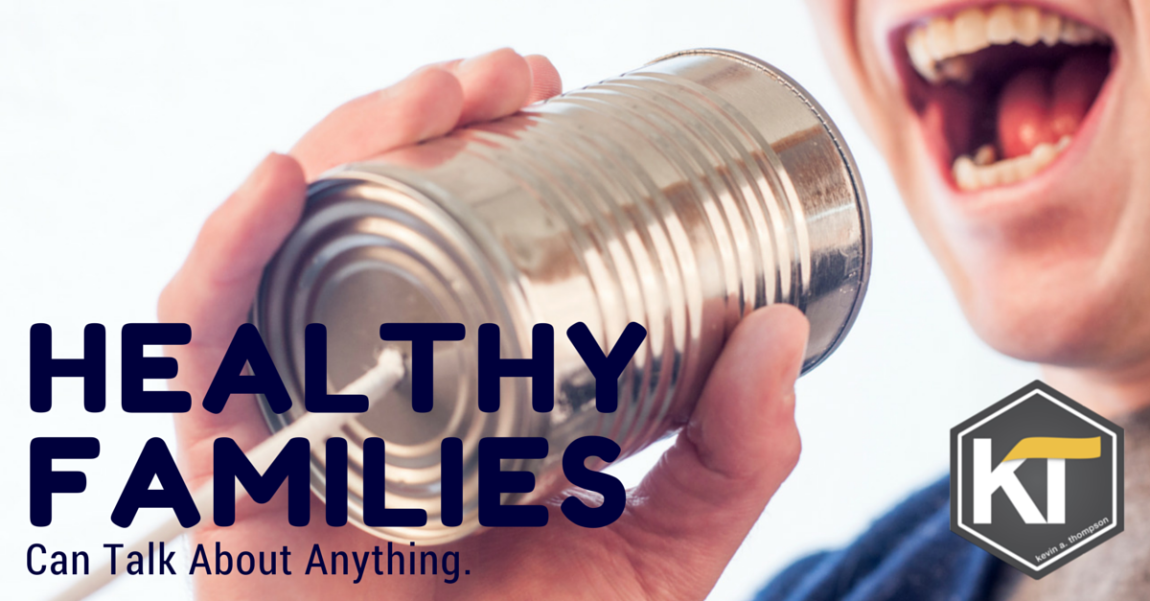Healthy families have one thing in common—they can talk about anything.
With sensitivity and age appropriateness, nothing is off-limits.
- No embarrassment
- No shushing
- No frantic looks with a whispered, “Not now.”
Communication thrives in healthy families.
Unhealthy families have many topics which are off-limits.
They can’t talk about:
- that one time
- that one person
- that one experience
- that one habit
- that one thing
They can’t talk about sex or death or their true emotions. (See: I Know Who Is In Charge of Your Family)
Rules are present. Everyone knows them. They are quickly introduced and strictly enforced.
Violate the rules—bring up the unsettled argument, mention the obvious problem, say the unspeakable words—and you are quickly rebuked.
In their book, Crucial Conversations, authors Patterson, Grenny, McMillan and Switzler make the point that we can discuss anything with anyone as long as we feel safe. As long as we feel as though we will be treated with kindness and compassion, that our hearts won’t be exploited, that we won’t be mocked or shamed, there is not a single topic which is off-limits.
Yet when we feel unsafe, we begin to put up barriers which impede communication.
Healthy families create safe climates in which communication can occur.
Unhealthy families create unsafe climates in which communication does not occur.
The homes of unhealthy families are full of:
Passive Aggressiveness: Communication is limited because a person doesn’t really say what they mean and anything they say might be used against them at a later time. Every conversation has to be deconstructed to find the unspoken intent. (See: 10 Communication Posts Your Co-workers Should Read)
Pointed Humor: Under the guise of laughter, the joke is really always on one of the family members. Sarcasm, stiff jabs, and cutting remarks appear light-hearted but are received as deeply personal wounds. No joke is meant for real humor; every comment is said with an intent to put another down.
Personal Attacks: Issues are never discussed because discussions never stick to the issues, they always turn personal. Problems aren’t seen as issues; they are viewed as people. If something is wrong that is because someone is wrong.
Shame: A person’s likes or desires are mocked and the person is made to feel like less of a person because of their preferences. Members are put down for revealing an aspect about themselves which the family believes should be kept hidden.
Contrast this with healthy homes which are full of:
Honesty: Each person says what they mean. No one will like everything that is said, but each person will be respected and their words heard. Issues are not blown out of proportion but they are also not denied. Each member of the family has the freedom and expectation to properly communicate what they think and feel. (See: It’s Not My Job to Read Your Mind)
Individuality: It’s expected each person will have their own feelings and opinions. It is not an attack on the family unit when one person disagrees. Differences are expected and encouraged. Conformity is shunned and each person is allowed to form their own conclusions.
Humor: When the tension rises, humor will be used to remind everyone that we are on the same page. It puts a conflict in perspective. Yet humor isn’t simply used during difficult discussions. Laughter is a constant quality of life in good times and bad.
Respect: More than the desire to be a right, a healthy family desires to show respect and honor to one another. They would never intentionally disrespect one another and when it does happen, an apology quickly follows. Privacy is protected and human dignity is preserved.
Communication is often an indicator of relational health. Healthy relationships have a free exchange of information which further strengthens bonds. Unhealthy relationships have restricted interactions. Each person is expected to operate within rigid boundaries in order to keep the appearance of peace. (See: Four Corner Stone Habits of Healthy Families)
It’s not a comprehensive test, but one indication of the health or dysfunction of your family can be defined by the simple question: is there anything your family cannot talk about?
If there is, something is probably wrong.




One Response to Healthy Families Can Talk About Everything